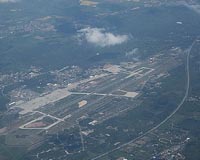| . |  |
. |
Jerusalem (UPI) Aug 17, 2009 The recent deadly shootout in a Gaza Strip mosque between Hamas, the Palestinian fundamentalist group that controls the coastal enclave, and a militant splinter faction inspired by al-Qaida was a wake-up call for the Gazan rulers. Hamas security forces stormed the two-story mosque in Rafah, on the strip's southern border with Egypt, on Aug. 15 after several hours of fighting. Fifteen members of the jihadist group Jund Ansar Allah (Warriors of the Companions of God) were killed, along with five Hamas personnel. The group's leader, Sheik Abdel-Latif Moussa, was among the dead. Hamas attacked after he challenged its authority by seizing the mosque to proclaim "the birth of an Islamic empire." It was the fiercest clash between Hamas and the jihadist groups -- both sides are Sunni Muslims -- since the 2007 takeover and indicated that Hamas will not tolerate any challenge to its authority. "No element or group has the authority to take the law into its own hands, and those who do not respect that will be dealt with by the security establishment," Hamas spokesman Sami Abu-Zuhari warned after the gun battles. Several jihadist factions have emerged in Gaza since Hamas took over the territory in June 2007 after a weeklong battle with its main rival, the secular Fatah movement founded by Yasser Arafat in the early 1960s that became the dominant Palestinian power. None of these factions is believed to have direct contact with al-Qaida's core leadership currently believed to be holed up in the tribal badlands of northwestern Pakistan. Although all of these groups are believed to have no more than a few dozen militants each, they have appeared to be growing in strength in recent months. Hamas' failure to repel a 22-day Israeli invasion of Gaza Dec. 28-Jan. 18 boosted recruitment by the jihadists. The last thing Hamas needs is problems with jihadists in its midst. The movement is grappling with Israel's military and its Fatah rivals in the West Bank. Indeed, these days the Israeli army and Fatah are working hand-in-hand against the fundamentalists. Hamas also is in the grip of an Israeli siege that has crippled the economy. That along with the poverty, lack of services and restriction of movement has caused resentment and instability, fertile ground for jihadist groups. Hamas has observed a de facto truce with the Israelis since the January fighting, and this has weakened its radical credentials in Gaza. The Rafah shootout is not the first challenge Hamas has faced from the jihadists -- and it probably won't be the last. Indeed, the tempo of actions by these groups appears to be accelerating and widening. Jund Ansar Allah emerged in November 2008 saying it sought to emulate al-Qaida. It was thought to have some 500 members, including fighters from Yemen, Egypt and Syria. Twenty of its men attempted to attack the Nahal Oz border crossing into Israel several weeks ago. Four of the jihadists were killed. Hamas officials also claim that Jund Ansar Allah was behind the bombing of a wedding of members of the family of Mohammed Dahlan, who once headed the Palestinian Authority's security services in the Gaza Strip. He led a major crackdown on Hamas several years ago that made him a marked man for the fundamentalists. The group has also bombed a cafe, a hairdressing salon and a music store, and threatened to burn down internet cafes. It is not clear why Hamas did not move against the group earlier, as the fundamentalists did with other jihadist factions. These included one named Jaish al-Islam (Army of Islam), which is allied to the extensive Dogmoush clan that kidnapped BBC journalist Alan Johnston in 2007. There are complex ideological and religious issues involved. Hamas is essentially a resistance organization fighting to end Israel's 42-year occupation of the Palestinian territories. It has shown no interest in Osama bin Laden's global war with the West. The jihadists have a much broader religious and political agenda, headed by restoration of the Islamic caliphate that stretched from the Arabian peninsula and central Asia to southern Spain -- Andalusia -- in the 8th century. Share This Article With Planet Earth
Related Links The Long War - Doctrine and Application
 German terrorists wanted to kill Americans
German terrorists wanted to kill AmericansDuesseldorf, Germany (UPI) Aug 13, 2009 Four terror suspects on trial in Germany told the court their hatred for the United States -- a country they claim is waging war against Islam -- has caused them to join the jihad. "We didn't want to kill two or three U.S. soldiers, but rather many," Fritz Gelowicz, the alleged ringleader of the so-called Sauerland terror cell, said earlier this week in the regional court of Duesseldorf ... read more |
|
| The content herein, unless otherwise known to be public domain, are Copyright 1995-2009 - SpaceDaily. AFP and UPI Wire Stories are copyright Agence France-Presse and United Press International. ESA Portal Reports are copyright European Space Agency. All NASA sourced material is public domain. Additional copyrights may apply in whole or part to other bona fide parties. Advertising does not imply endorsement,agreement or approval of any opinions, statements or information provided by SpaceDaily on any Web page published or hosted by SpaceDaily. Privacy Statement |